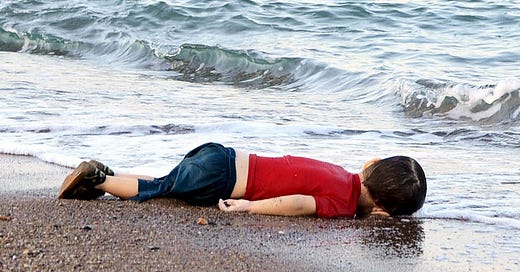The images of two-year-old Alan Kurdi lying dead on a beach haunts me. Those photos make me physically ill. Kurdi was my son’s age. I see the above image every night when I check on both my children whom often sleep in that same repose. Only they are still breathing.
Kurdi died in 2015, around the height of the European migrant crisis. The image sparked international outrage and stood as a reminder to the world of its responsibility to migrants, refugees and asylum-seekers.
Those who flee war, economic instability, famine, climate change, and political persecution, still undertake dangerous journeys. (Exceptions made for Ukrainians fleeing the Russian invasion have sparked controversy and criticism; enriching those criticisms is President Joe Biden’s new program to bring Ukrainians to America, called "Uniting for Ukraine." Some of the program’s critics have called for an overhaul of the U.S. refugee resettlement program while adding other vulnerable groups to the program, calling the "humanitarian parole" status of Ukrainians fleeing the war a lousy stopgap. It should be noted, however, that many of those fleeing Ukraine are women and children who intend to return home once the war ends.)
Our responsibility to those people has largely flagged.
Last autumn, I traveled to Malta to report on the case of three young people charged with commandeering a bunker tanker, named the El Hiblu 1, that rescued their sinking dinghy. The boys are alleged to have then hijacking the vessel into European waters. But accounts from aboard the ship vary widely.
In some ways, the case of El Hiblu is a classic one: refugees and migrants from Africa seek safety and economic opportunity in Europe, and instead discover a Europe that has become increasingly inhospitable to people fleeing hardship and violence in Africa.
But the case is also unusual in troubling ways: never before, according to legal experts I spoke with, have migrants and refugees faced terrorism charges for rescuing themselves while also being accused of commandeering a ship.
And today, after three years, the boys’ trial plods along with a hearing roughly every month, with just one witness called to the stand each time. The Maltese prosecutors, along with the government, arresting officers, and courts refused to comment on this story as the case is ongoing. It is unclear when, or how, the trial might end.
That story appears today in The New Republic. It’s part narrative and part analysis, chronicling the journey of the three teenagers charged with the hijacking and the legal dragnet that’s formed around “Fortress Europe” in the last half-decade to not only prevent sea arrivals, but to also prosecute those who aim to help anyone making the journey.
The TNR piece follows an analysis I co-wrote last year with a colleague at the Washington Institute for Near East Policy. This was long before the Russian invasion of Ukraine, but many of the options for border security remain pertinent.
Other personal updates:
I’ll be writing a monthly column for Inkstick starting next month. The column will cover the "The Changing of a Continent," focusing on the way Europe is awakening to its security flaws, energy woes, and insecure borders, and how the bloc is shifting its reliance away from the U.S. toward other allies. If you’ve any ideas for or want to share your research or tips, send them to: kenrosen@protonmail.ch or kenneth.r.rosen@gmail.com
This week I’ll also be in Chicago for two events promoting Troubled: The Failed Promise of America’s Behavioral Treatment Programs:
The first event is a private key note presentation at the Chasing Hope Foundation’s Annie Awards luncheon on Friday.
Later on Friday, I’ll present a talk and a discussion at Northwestern University’s Evanston Campus. The event is tentatively titled “Everyone is Lying: The Pursuit of Fact Amid War,” which was also the name of a class I hope to teach one day. The Russian, Eurasian, and East European Studies Research Program, the Medill School of Journalism, and the Department of Political Science are jointly hosting this event. I will speak broadly about the evolution of wartime/war zone journalism, both from my personal experiences and drawing more broadly on trends I’ve observed in the field.
Signed copies of the book will be available at The Book Stall, one of the region's most beloved independent book stores.
Afterward, I’ll spend two weeks in residence at the Virginia Center for the Creative Arts. My aim there is to make some headway on a long-stalled book project.
That’s all for now. Talk soon.
-ken




